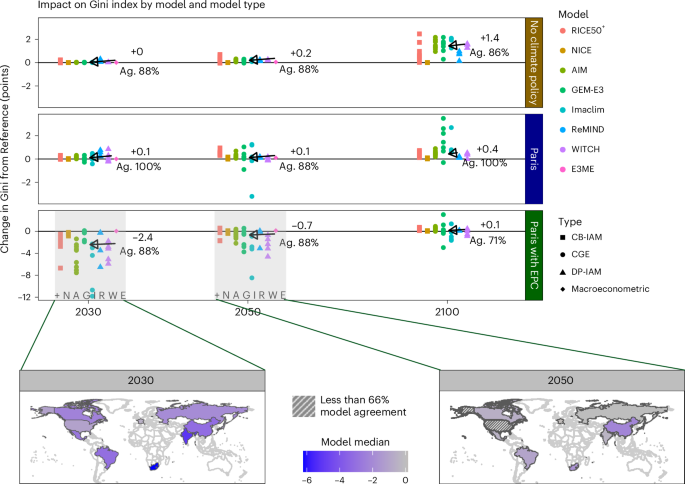对不平等和气候变化的多模型评估
IF 27.1
1区 地球科学
Q1 ENVIRONMENTAL SCIENCES
引用次数: 0
摘要
气候变化和不平等是相互关联的关键问题。尽管有关气候政策和气候风险对分配影响的经验证据越来越多,但基于模型的主流评估往往对气候变化与经济不平等之间的相互作用保持沉默。在这里,我们通过八个大型综合评估模型的组合来填补这一空白,这些模型属于不同的经济范式,并具有收入异质性的特点。我们量化了气候影响和符合《巴黎协定》目标的不同气候政策补偿方案对分配的影响。到 2100 年,气候影响将使不平等程度平均增加 1.4 个基尼指数点。将全球平均气温维持在 1.5 °C 以下可将长期不平等的增加减少三分之二,但短期内会略有增加。然而,同等的人均再分配可以抵消短期影响,使基尼系数降低近两个点。我们对模型的不确定性进行了量化,并发现有力的证据表明,精心设计的政策有助于稳定气候和促进经济包容性。本文章由计算机程序翻译,如有差异,请以英文原文为准。


A multi-model assessment of inequality and climate change
Climate change and inequality are critical and interrelated issues. Despite growing empirical evidence on the distributional implications of climate policies and climate risks, mainstream model-based assessments are often silent on the interplay between climate change and economic inequality. Here we fill this gap through an ensemble of eight large-scale integrated assessment models that belong to different economic paradigms and feature income heterogeneity. We quantify the distributional implications of climate impacts and of the varying compensation schemes of climate policies compatible with the goals of the Paris Agreement. By 2100, climate impacts will increase inequality by 1.4 points of the Gini index on average. Maintaining global mean temperature below 1.5 °C reduces long-term inequality increase by two-thirds but increases it slightly in the short term. However, equal per-capita redistribution can offset the short-term effect, lowering the Gini index by almost two points. We quantify model uncertainty and find robust evidence that well-designed policies can help stabilize climate and promote economic inclusion. Climate change and economic inequality are critical issues, and we still lack understanding of the interaction between them. Multi-model analysis shows how climate policies compatible with the goals of the Paris Agreement, including revenue-redistribution schemes, can reduce inequality—particularly in the short and medium terms.
求助全文
通过发布文献求助,成功后即可免费获取论文全文。
去求助
来源期刊

Nature Climate Change
ENVIRONMENTAL SCIENCES-METEOROLOGY & ATMOSPHERIC SCIENCES
CiteScore
40.30
自引率
1.60%
发文量
267
审稿时长
4-8 weeks
期刊介绍:
Nature Climate Change is dedicated to addressing the scientific challenge of understanding Earth's changing climate and its societal implications. As a monthly journal, it publishes significant and cutting-edge research on the nature, causes, and impacts of global climate change, as well as its implications for the economy, policy, and the world at large.
The journal publishes original research spanning the natural and social sciences, synthesizing interdisciplinary research to provide a comprehensive understanding of climate change. It upholds the high standards set by all Nature-branded journals, ensuring top-tier original research through a fair and rigorous review process, broad readership access, high standards of copy editing and production, rapid publication, and independence from academic societies and other vested interests.
Nature Climate Change serves as a platform for discussion among experts, publishing opinion, analysis, and review articles. It also features Research Highlights to highlight important developments in the field and original reporting from renowned science journalists in the form of feature articles.
Topics covered in the journal include adaptation, atmospheric science, ecology, economics, energy, impacts and vulnerability, mitigation, oceanography, policy, sociology, and sustainability, among others.
 求助内容:
求助内容: 应助结果提醒方式:
应助结果提醒方式:


